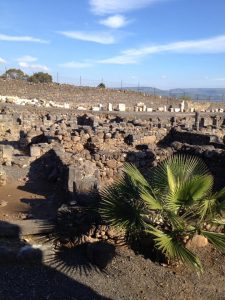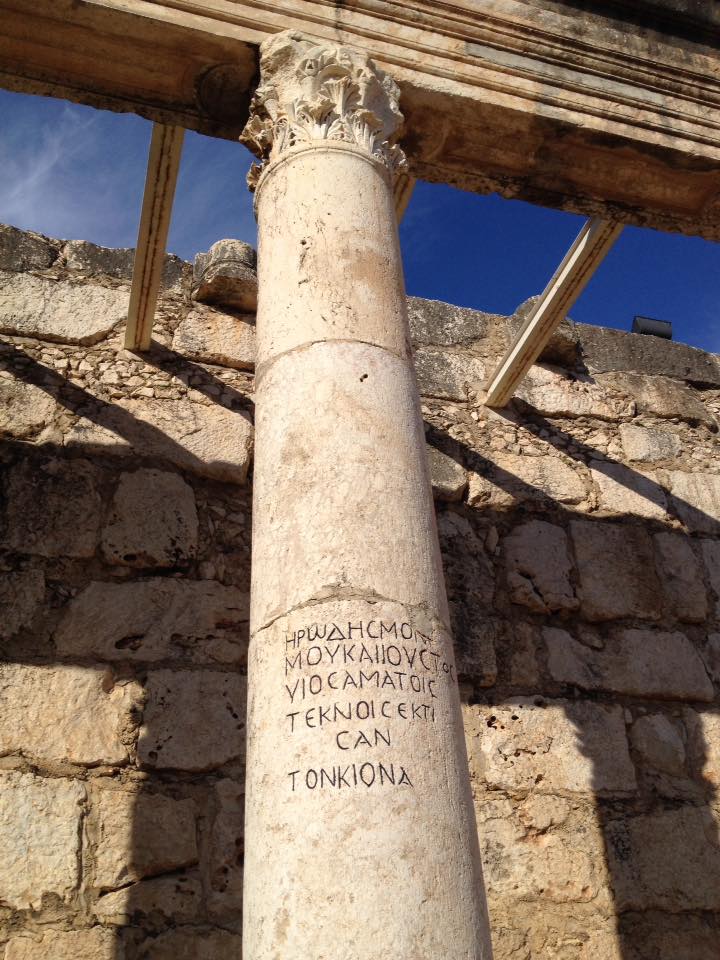Narrative Lectionary, Year 3, February 5, 2017
Lessons: Luke 7:1-17, Psalm 119:105-107 or 119:107
Theme: God’s faithful and generous people hear the stories of Jesus’ miracles and by faith continue to walk as disciples in Jesus’ footsteps, stewarding the good news and sharing it lavishly.
Key Scripture: When Jesus heard this he was amazed at him, and turning to the crowd that followed him, he said, “I tell you, not even in Israel have I found such faith.” Luke 7:9
Preaching/Teaching Reflection
Just last week I was able to walk in the footsteps of Jesus and his disciples through the ruins of what was once Capernaum. Perhaps you have done so, too. As I stood in  the center of what was once the synagogue built by the centurion, I was struck by this story from Luke’s gospel, the account of the people’s intercession on behalf of the good man (a Roman) and his gravely ill slave. Of course, the real star of the story is the centurion, whose own faith and understanding are what cause Jesus to be amazed.
the center of what was once the synagogue built by the centurion, I was struck by this story from Luke’s gospel, the account of the people’s intercession on behalf of the good man (a Roman) and his gravely ill slave. Of course, the real star of the story is the centurion, whose own faith and understanding are what cause Jesus to be amazed.
Cities will rise and fall and buildings will crumble to a jumble of stones and dust, just as Capernaum did. Yet we continue to tell this story of Jesus healing the centurion’s slave with a simple word, and we recount with amazement the restoration of the widow’s son in Nain. Yes, cities fall into decay, but Jesus raises the dead and heals the dying.
This is good news for those of us who are living in anxious and confusing times. Even though Jesus no longer walks this earth in flesh and bone, he is still very much in the business of raising the dead and healing the dying. And, we are called to nurture and cultivate the gift of faith with which we have been entrusted.
What can we take from these two healing stories that applies to our lives as faithful stewards and disciples today? First, there is strength to be celebrated in the centurion’s bold response and his absolute faith in Jesus’ ability to restore the servant to health. There is no wavering, no hesitancy, and no conditions placed upon his faith in Jesus. His is a great model to look to in times of trial or tribulation. Jesus does not leave this man bereft, and neither will Jesus leave us in that condition.
We can also take comfort in the fact that Jesus continually draws the circle wider. The centurion, although beloved by the Jews of Capernaum, was an outsider. Yet even so, Jesus finds him faithful and responds by healing his slave. God continues to work through outsiders and unexpected people to further the work of the kingdom. Truly, no one is outside the wide net of God’s amazing grace.
Finally, in the story of the widow of Nain, we see Jesus exhibit great compassion for the plight of this woman being pushed even further to the margins. As a woman with no living male relative, she faces a future that is incredibly bleak, and so our Lord restores her fortunes by raising her son from the dead. In short, nothing is beyond Jesus—then, now, or in the time to come.
 As disciples of Christ, we too, are called to live with compassion for those around us. Compassion is what compels us to act on behalf of the marginalized, the poor, and the vulnerable. It is what compels us to be in relationship with those who are not like us. Compassion is not transactional; it is much more than handing a bag of groceries or donating our old clothes to charity. Compassion is about engagement, relationship, and loving one’s neighbor.
As disciples of Christ, we too, are called to live with compassion for those around us. Compassion is what compels us to act on behalf of the marginalized, the poor, and the vulnerable. It is what compels us to be in relationship with those who are not like us. Compassion is not transactional; it is much more than handing a bag of groceries or donating our old clothes to charity. Compassion is about engagement, relationship, and loving one’s neighbor.
Through the gift of our faith and by the power of the Holy Spirit we are equipped to be God’s compassionate and trusting people. As we deepen our worship, prayer life, and study of scripture, we will experience God working in and through us to bring new life, healing, and hope. Like the centurion we may then say, “But only speak the word, and let my servant be healed.”
In Worship
Consider adding prayers for healing and anointing today as part of your worship. Include a hymn such as “Healer of Our Every Ill” (Evangelical Lutheran Worship #612) or “When Pain of the World Surrounds Us” (Evangelical Lutheran Worship #704).
With Youth
Why did the centurion believe he was not worthy of Jesus’ intervention and healing of his servant? Was he second-guessing his initial request for help? Was he worthy—or not? Invite youth to think about the concept of worthiness. Are any of us worthy of Jesus’ intervention, love, and healing? Of course the answer is no, but the rest of the story is that because of who Jesus is and because of his amazing grace and mercy, we are made worthy. Talk about what it means to be worthy of this unmerited grace: How can we share it with others and spread the good news?
With Children
Jesus heals and gives second chances in this week’s gospel story. How does Jesus work through our hands today to give second chances? If you have someone in your congregation who has been the recipient of a transplant, someone who has given an organ, or who has lost a loved one was an organ donor, invite them to share their story of how a second chance at life was made possible. If you don’t have anyone in your parish, seek out a news story to share (there are plenty out there!). Talk about how God uses the skills and hands of medical professionals to make this second chance at life possible, and how our prayers are also important. Just as Jesus raised the widow’s son, today many other people are raised to new opportunities and a fresh chance at life through others’ generous gifts. Say a prayer of thanks for the gift of life, for the gift of second chances, and for the amazing grace of Jesus.
Weekly Stewardship Bulletin Insert
How are you stewarding the gift of faith that God has entrusted to you? The centurion in this week’s lesson has faith that amazed even Jesus. Are you praying for God’s will and design for your life to be fulfilled? Are you praying for others in expectant hope and trust? Are you spending time in prayer—both listening and speaking—to God and dwelling in the word? Let us pray for one another knowing that God is with us and among us and will not leave us bereft.
Stewardship at Home
This week spend some time praying the Psalm verses (119:105-107) and ponder how God’s word is a lamp that lights our way in this world. Consider how in the promises made in baptism and in affirmation of baptism we confirm our intent to follow God’s “righteous ordinances.” Finally, spend time with verse 107: “I am severely afflicted;/give me life, O Lord, according to your word.” How might this last verse be a prayer for every day? What does the life for which we pray look like? How can we be better stewards of the gift of faith that we are given?
Think of someone in your congregation, in your community, or around the world who needs your intercession on their behalf for healing and life. Pray for that person(s) each day this week, trusting that God hears our prayers and does respond in divine time.
Photos: S Blezard and John Christian Fjellestad, Creative Commons. Thanks!
Note: Reprint rights granted to congregations and other church organizations for local, nonprofit use. Just include this note: “Copyright (c) 2017, Rev. Sharron Blezard. Used by Permission.” Other uses, please inquire: thewritelife@hotmail.com.




Leave a Reply